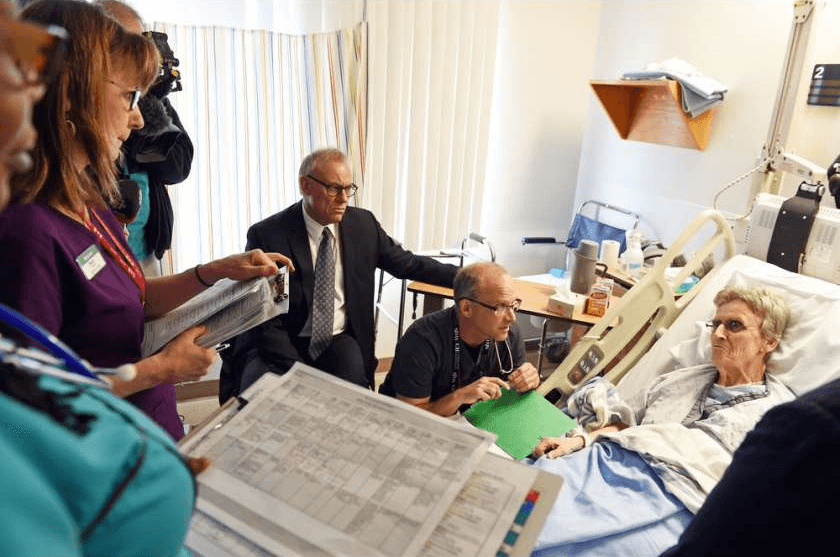Elevating Patient Care: The Crucial Role of Interdisciplinary Bedside Team Rounds


Introduction
The pressures of modern hospital care demands efficient and effective care from a multitude of stakeholders coupled with patient and family engagement. With collaboration and teamwork essential to just getting patients out the door, the significance of interdisciplinary bedside team rounds cannot be overstated. These rounds represent a pivotal moment where the collective expertise of healthcare professionals converges to provide comprehensive, patient-centered care. Here we discuss the importance of embracing and championing interdisciplinary bedside team rounds for the benefit of both patients and healthcare providers.
Holistic Patient Care
Interdisciplinary bedside team rounds foster a holistic approach to patient care by bringing together professionals from diverse disciplines, including physicians, nurses, therapists, and social workers. This collaborative setting allows for a comprehensive understanding of the patient's condition, ensuring that medical, psychological, and social aspects are all considered in the decision-making process.
Improved Communication
Effective communication is the backbone of successful healthcare delivery. Interdisciplinary bedside rounds create a platform for open and transparent communication among team members. This not only enhances the exchange of critical information but also promotes a shared understanding of the patient's care plan, goals, and potential challenges.
Timely Decision-Making
In the fast-paced environment of healthcare, timely decision-making is crucial for patient well-being. Interdisciplinary bedside rounds facilitate real-time discussions, enabling healthcare professionals to collaborate on immediate decisions regarding diagnostics, treatments, and care plans. This agility contributes to more responsive and patient-centric care.
Enhanced Patient Engagement
Including patients and their families in interdisciplinary bedside rounds promotes active engagement and shared decision-making. Patients gain a deeper understanding of their care plans, contributing to better compliance and satisfaction. Involving patients in discussions also empowers them to play an active role in their healthcare journey.
Continuity of Care
Interdisciplinary bedside team rounds promote continuity of care by fostering seamless communication between healthcare providers across shifts and disciplines. This collaborative approach reduces the risk of information gaps, ensuring that the patient's care plan remains consistent and aligned with evolving needs.
Education and Professional Development
Participating in interdisciplinary rounds offers physicians valuable opportunities for continuous learning and professional development. Exposure to different perspectives and expertise enhances the physician's knowledge base and encourages a culture of lifelong learning within the healthcare team.
Team Cohesion and Job Satisfaction
Collaborating in interdisciplinary rounds builds a sense of camaraderie and cohesion among healthcare team members. Physicians working in a supportive and collaborative environment often experience increased job satisfaction, leading to a more positive workplace culture and, ultimately, improved patient care.
The Future of Patient-Centered Care
Interdisciplinary bedside team rounds stand at the forefront of patient-centered care, embodying the principles of collaboration, communication, and comprehensive decision-making. As physicians, your active participation and advocacy for this approach are instrumental in shaping the future of healthcare delivery. By embracing interdisciplinary teamwork at the bedside, you not only enhance patient outcomes but also contribute to a healthcare ecosystem where collaboration thrives, and each professional's expertise is valued.
Elevate patient care, foster collaboration, and champion the power of interdisciplinary bedside team rounds as a cornerstone of your medical practice. We've helped 100s of physicians at hospitals around the world experience the benefits of interdisciplinary bedside team rounds as part of our SIBR Rounds Program.
The Top 10 Benefits of Structured Interdisciplinary Bedside Rounds (SIBR) as reported by Physicians practicing in the model
Reduced Interruptions: My day is suddenly more structured and focused because everyone else holds their “doctor questions list” for SIBR. The old fire hose of interruptions is now a trickle. And the remaining interruptions are mostly context-rich and quicker.
Less chart review: During SIBR, the nurse and pharmacist presents to me exactly the clinically relevant info I want, like it’s on a silver platter. It’s so high-yield: I get in 2 minutes what would have taken me 10 minutes poring through the chart to get.
Efficiencies: Everything’s getting taken care of all at once during SIBR. Everyone now knows what I know, and I know what everyone knows. With everyone on the same page, we are more efficient. I was worried it would be more work, but I’m actually able to wrap up my day earlier – usually.
Less burden: The care team is more “switched on,” and SIBR lets me hand off things I used to feel like I had to hold onto. My teammates are more invested and eager to help; they know the plan -- what to do to make progress -- and they can take over all these tasks they’re experts in.
Discharge coordination: Average Length of Stay has decreased without it being a huge focus, because SIBR ends up being the ideal discharge huddle – everyone knows the blockers and how they can help. And the discharge coordinator gets more time in the day to do things like making calls for placement.
Evidence-based medicine: The clinical microsystem we work in can greatly affect patient outcomes. The SIBR model reduces human error and prevents many predictable harm events. I’ve looked at the studies, and units without SIBR show worse clinical outcomes. As a physician, that would go against my oath.
Professionalism: The care we’re giving now is more professional, enjoyable, and rewarding. Motivation is high.
Work Family: We feel like a work family. I know most of the nurses by name now. There’s a sense of not wanting to let the team down.
Family engagement: Engaging patients and families on rounds saves tremendous downstream time. I’m spending much less time on calls with family.
Patient engagement: Patients love SIBR, and that makes us appreciate it more. Visiting the patient with a well-prepared care team each day feels like a “cheat code” for engaging patients the way they want.
Keep Exploring Our Work



